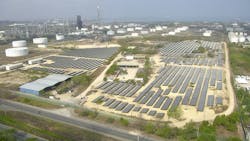Ecopetrol’s Cartagena refinery enters planned maintenance
Ecopetrol SA subsidiary Refinería de Cartagena SAS (Reficar) has started scheduled maintenance works on three processing units at its 210,000-b/d refinery located in the Mamonal Industrial Zone on Cartagena Bay, south of Cartagena, on Colombia’s northern coast.
Under way as of July 22 and scheduled to run for 50 days, the 2024 planned maintenance primarily will involve work to replace more than 1.2 million lbs of catalyst total in the refinery’s hydrocracking, hydrogen production, and sulfur recovery units, making it the operator’s largest-ever catalyst changeout, Ecopetrol said.
Replacement of catalyst in the three units is required to ensure Reficar’s production of fuels at the site conforms to fuel-quality standards required by Colombian government regulations, according to Ecopetrol.
Requiring an overall investment of $243 million and a planning period of more than 2 years, Ecopetrol confirmed the planned maintenance event also will include general maintenance inspections and works on unidentified compressors, motors, pipes, and exchangers to guarantee safer and more efficient operations.
Unit shutdowns required during the maintenance period will not impact Reficar’s supply of transportation fuels from the refinery to Colombian markets, the parent company said.
In fourth-quarter 2023, the Cartagena refinery began delivery of Euro 4-quality premium gasoline with a maximum sulfur content of 15 ppm compared with its previous supply of gasoline containing 50 ppm of sulfur, Reficar said in a Nov. 9, 2023, release.
In its 2023 sustainability report, Reficar said it will execute further upgrades to the refinery’s delayed coker and naphtha hydrotreater to ensure production of gasoline with a sulfur content of 10 ppm to Colombia’s market by 2030.
Going greener
Confirmation of the current maintenance event at Cartagena follows a series of recent works Reficar has undertaken to improve environmental performance of the refinery in line with Ecopetrol’s commitment to achieve carbon neutrality of its operations related to Scopes 1 and 2 emissions of greenhouse gases by 2050.
Earlier in the year at Cartagena, Ecopetrol completed construction of Latin America’s first-ever solar farm to be built inside a refinery, Reficar confirmed in an Apr. 12, 2024, release.
Located across a 19.9-hectare plot of land and consisting of 40,146 panels, Cartagena’s solar farm is equipped with a capacity of 22.1 Mw for delivery of up to 34.4 million kw-hr/year of electricity.
Scheduled to reach full design capacity this year, Reficar said the solar farm will reduce carbon dioxide (CO2) emissions from the refinery by 21,000 tonnes/year (tpy) once fully operational.
Other works to improve environmental performance of the Cartagena refinery include:
- Installation of pilot plants in 2023 to explore carbon capture and utilization.
- Startup in 2023 of a water neutrality project to explore the potential for completely reusing the site’s wastewater, using alternative sources such as seawater desalination, and improving technologies in the refinery’s cooling systems.
- Installation in 2022 of a pilot plant containing a 50-kw proton exchange membrane (PEM) electrolyzer and 270 solar panels for production of green hydrogen.
- Testing in 2023 for production of renewable diesel via co-processing in the refinery’s diesel hydrotreating unit.
- Planned industrial testing in 2024 for production of sustainable aviation fuel (SAF).
- Planned industrial testing in 2024 for processing post-consumer plastic in the refinery’s delayed coker.
- Approval in 2023 of a project to explore potential production of petrochemicals and aromatics from naphtha and hydrogen.
These programs follow smaller works Reficar implemented between 2018 and 2023 to improve energy efficiency of the Cartagena refinery that—all focused on optimizing consumption of electricity, natural gas, and thermal energy—helped reduce the site’s CO2 emissions by 274,000 tpy, the operator said in February 2024.
About the Author
Robert Brelsford
Downstream Editor
Robert Brelsford joined Oil & Gas Journal in October 2013 as downstream technology editor after 8 years as a crude oil price and news reporter on spot crude transactions at the US Gulf Coast, West Coast, Canadian, and Latin American markets. He holds a BA (2000) in English from Rice University and an MS (2003) in education and social policy from Northwestern University.

